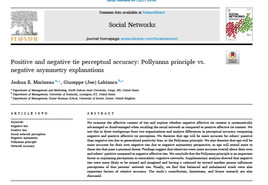Most recent research activity |
|
|
A new paper Uncovering the cultural beliefs in a nascent entrepreneurial ecosystem was accepted for publication in the Entrepreneurial Research Journal. This paper was coauthored with Dr. Onnolee Nordstrom of NDSU examines the shared mental models of entrepreneurship within a local startup community. We use a novel approach to measure and analyze mental models using Cultural Consensus Analysis and Social Network Analysis. We were primarily interested in how nascent ecosystems' cultural beliefs differ from mature ecosystems. This study was conducted in Fargo, ND and was part of a research grant I was awarded by the Marion Kauffman Foundation. This is the first published paper from this grant and we are excited to see it get published. You can read the full version here: www.researchgate.net/publication/344787220_Uncovering_cultural_beliefs_in_a_nascent_entrepreneurial_ecosystem ABSTRACT
In this paper, we use Cultural Consensus as a theory and methodology and collect and analyze individuals' mental models of entrepreneurship. This novel approach, combined with social network analysis, allows us to empirically study the shared cultural beliefs present within a nascent EE. Based on this case, we determine that, in contrast to mature ecosystems, the cultural beliefs within this nascent entrepreneurial ecosystem clearly prioritize action and behavioral elements over individual characteristics or entrepreneurial-related outcomes. Thus, our study suggests that the cultural beliefs within early ecosystems are different than the cultural beliefs that underpin mature ecosystems. We discuss implications and future research related to these findings and this approach.
0 Comments
 I recently had an article accepted for publication at the journal Social Networks with my co-author Joe Labianca, entitled: Positive and negative tie perceptual accuracy: Pollyanna principle vs. negative asymmetry explanations. This paper is based on my research on social network cognition, or people's perceptions of the social relationships around them. Here we examine how people are able to accurately perceive positive compared to negative relationships at work. Long story short, people are much worse at recalling negative relationships (dislike) than positive relationships (friendship). This is the first paper to really delve into this comparison and has ramifications for work in a variety of areas. https://doi.org/10.1016/j.socnet.2020.07.008 Abstract is below: AbstractWe examine the affective content of ties and explore whether negative affective tie
content is systematically advantaged or disadvantaged when recalling the social network as compared to positive affective tie content. We test this in three workgroups from two organizations and analyze differences in perceptual accuracy comparing negative and positive affective tie perception. We theorize that ego will be more accurate for others’ positive than negative ties due to generalized positivity bias, or the Pollyanna principle. We also theorize that ego will be more accurate for their own negative ties due to negative asymmetry perspective, as ego will attend more to those ties that pose a personal threat. Findings suggest that observers were more accurate overall about their own and others’ positive compared to negative affective ties. We conclude that the Pollyanna principle is an important factor in explaining perceptions in naturalistic cognitive networks. Supplementary analysis showed that negative ties were more likely to be missed and imagined and having a valenced tie toward another person influences perceptions of that persons’ network ties. Finally, we find that balanced and imbalanced triads were also important factors of relative accuracy. The study’s contribution, limitations, and future research are also discussed. |
AuthorDr. Josh Marineau ArchivesCategories |
 RSS Feed
RSS Feed